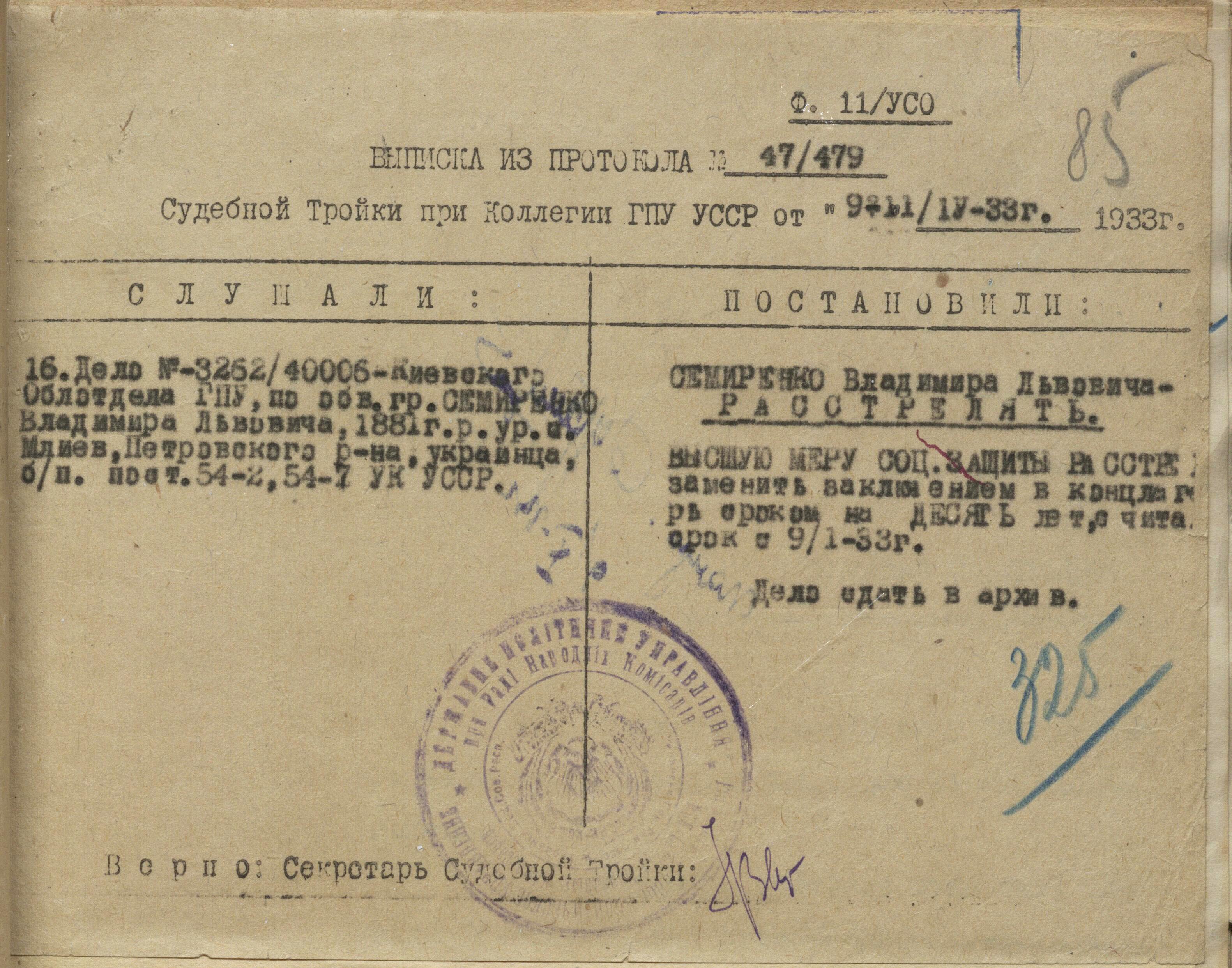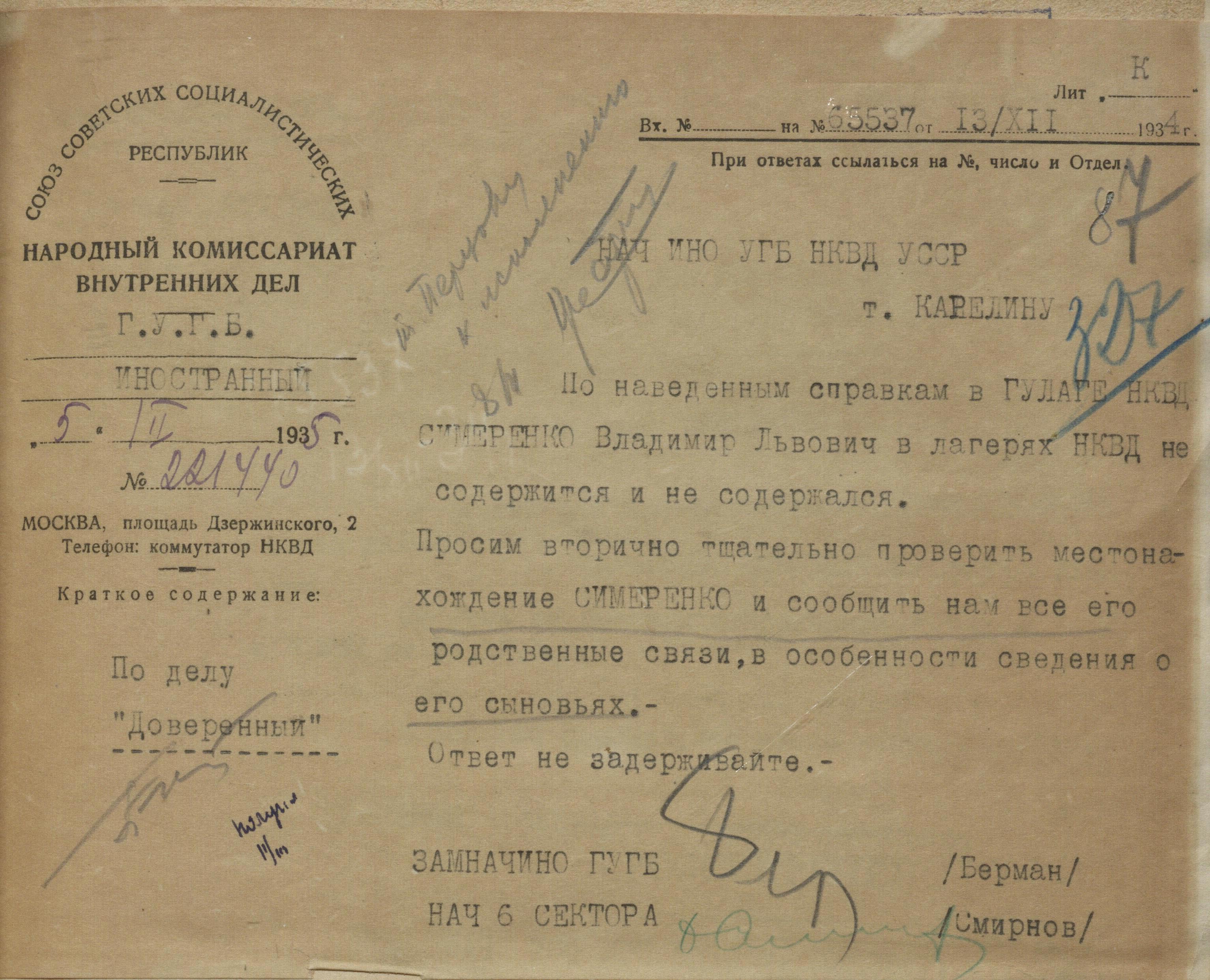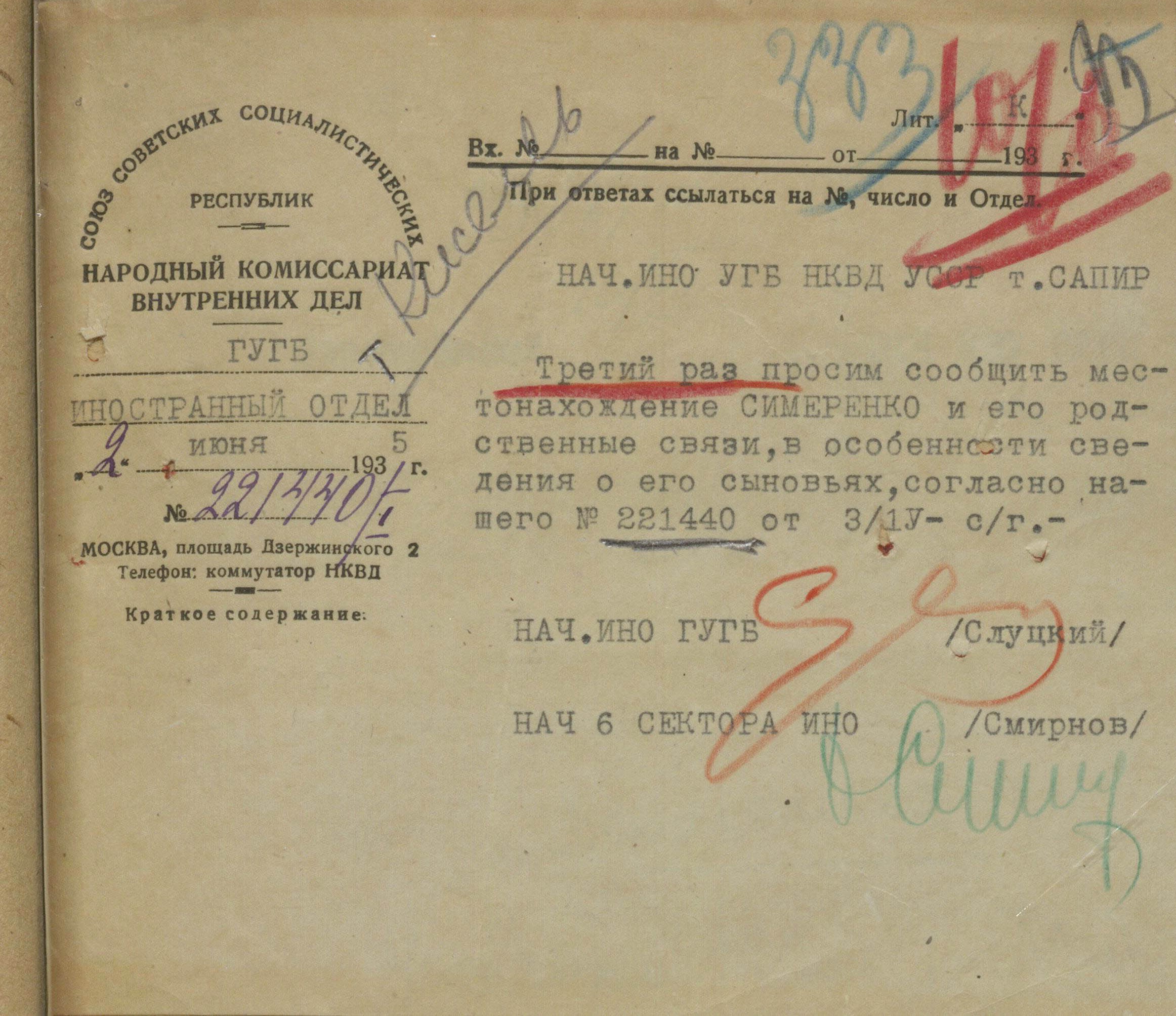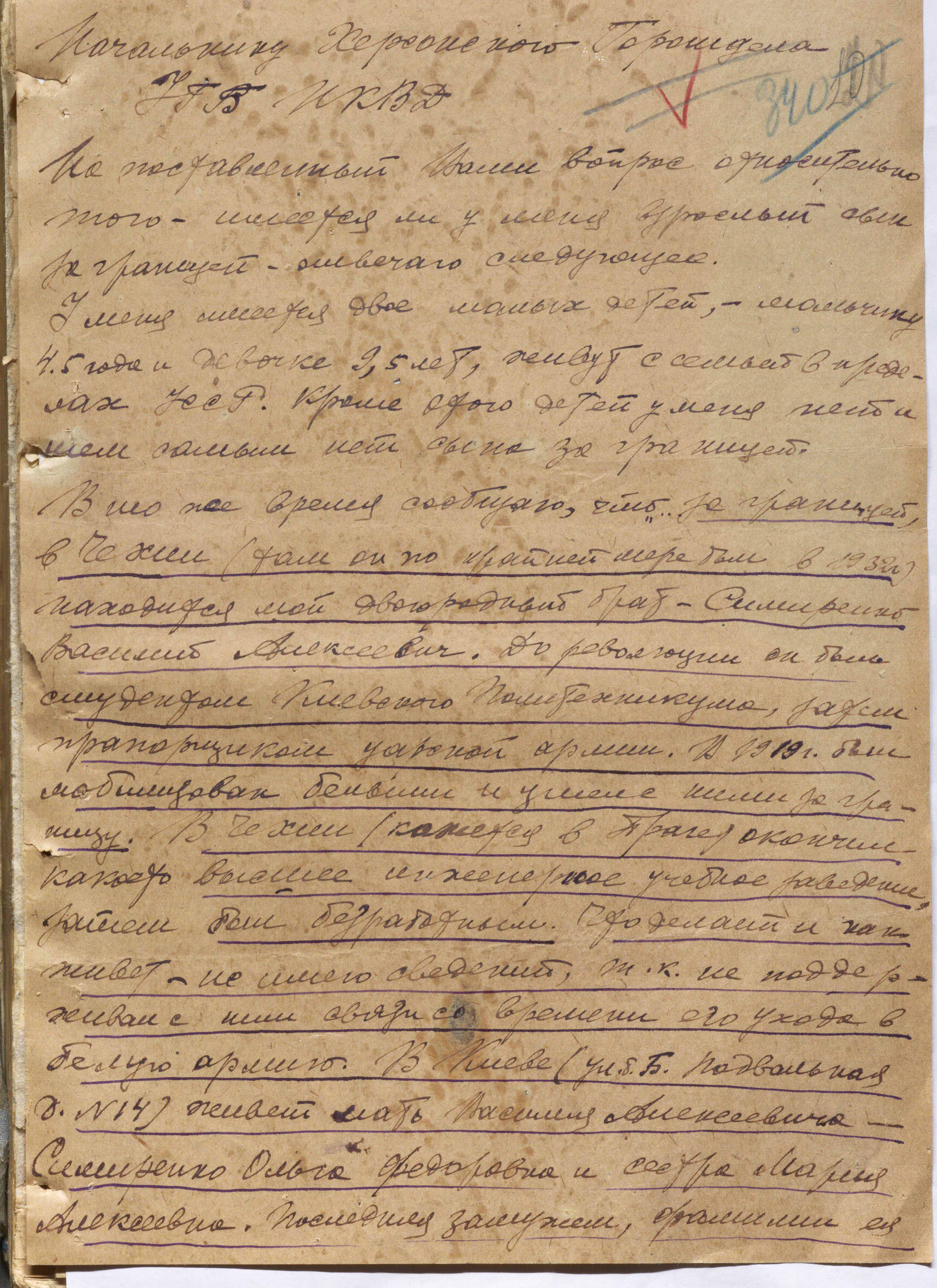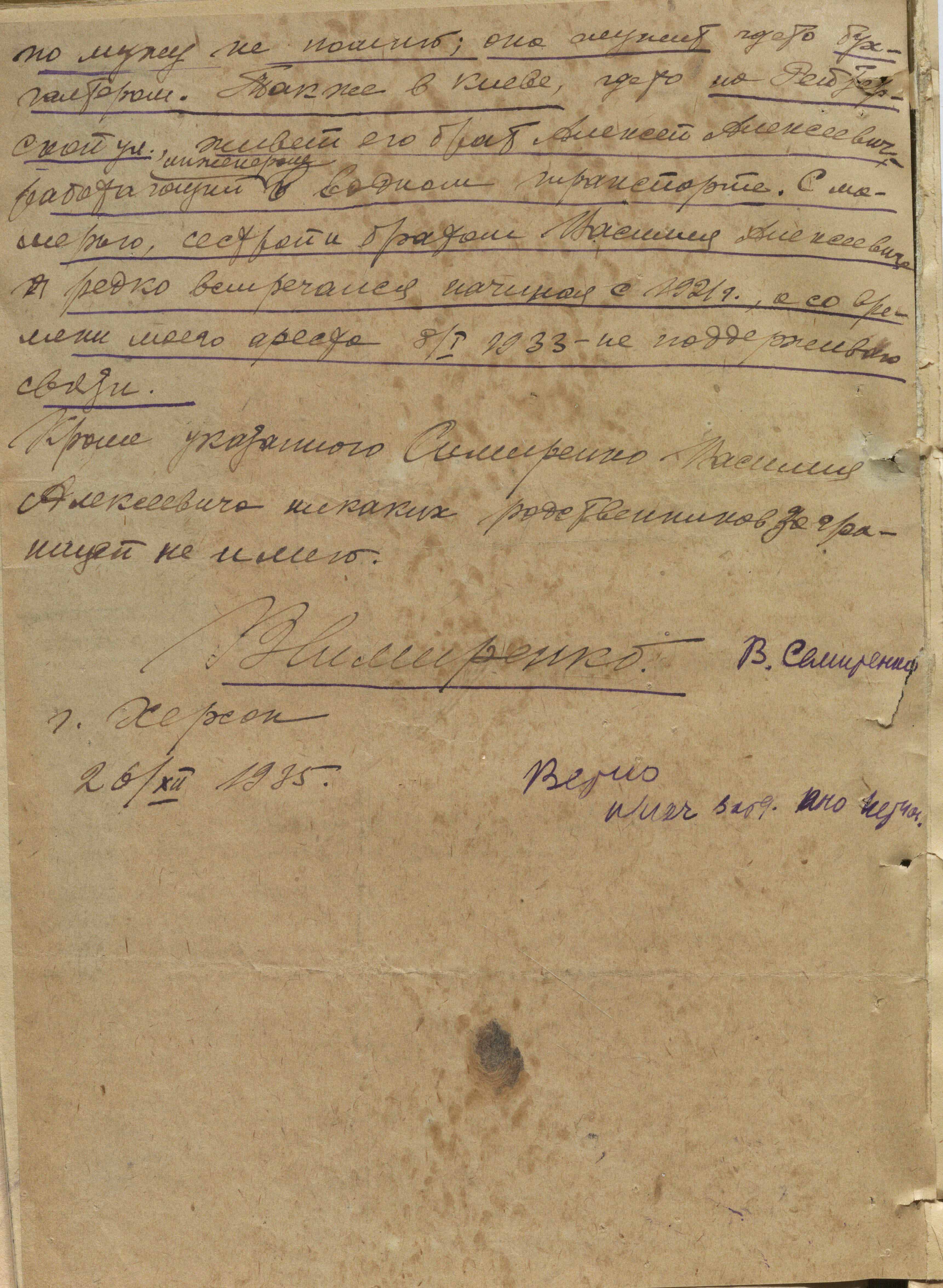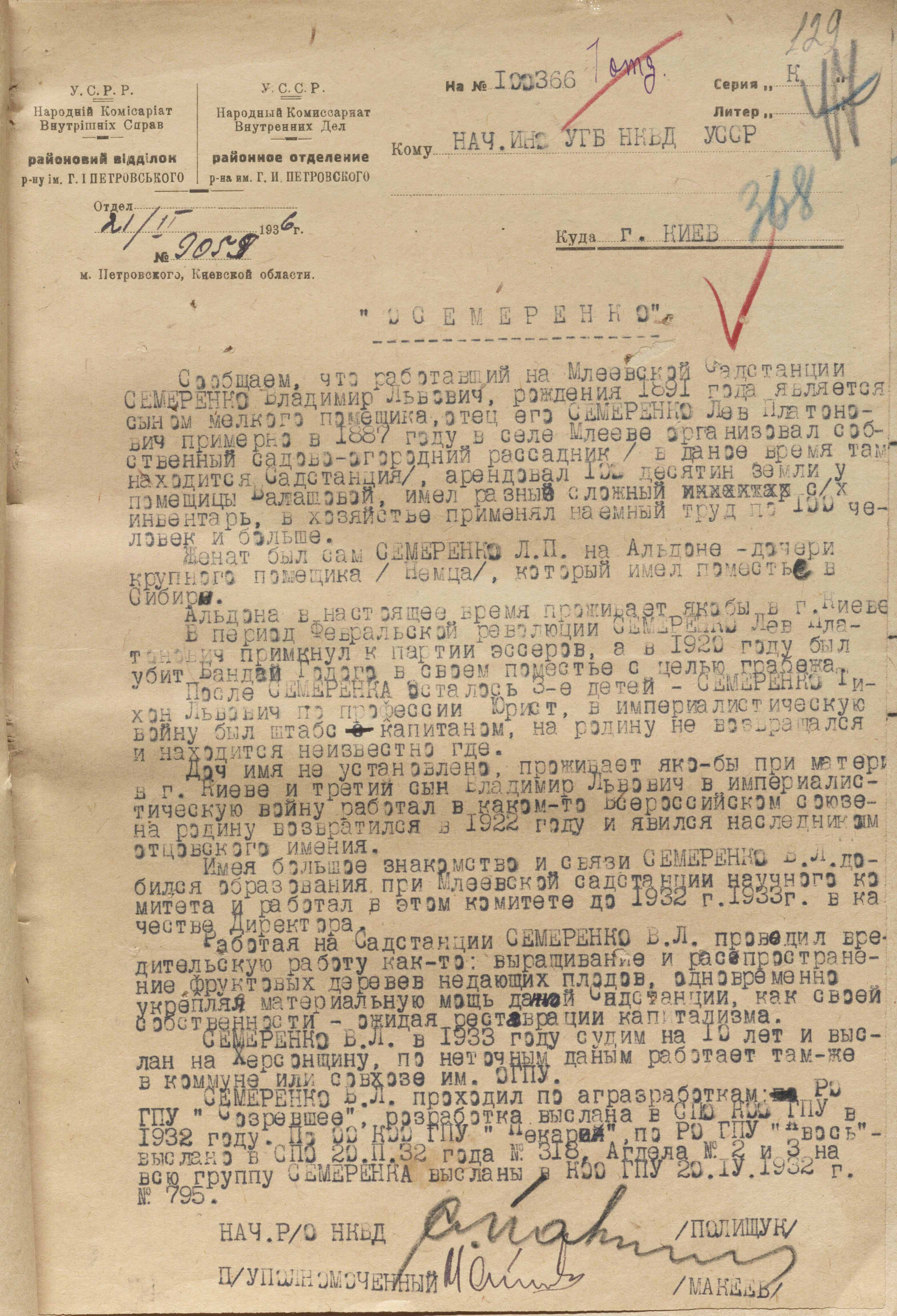How the nkvd of the ussr “Lost” Volodymyr Symyrenko
12/29/2023

December 29 marks the 132nd anniversary of the birth of Volodymyr Symyrenko, an outstanding Ukrainian gardener and plant breeder who became a victim of Stalin's terror. He was accused of sabotage and anti-soviet activities. A number of articles and books have been written about his three arrests and two death sentences based on the materials of investigative cases. At the same time, some documents from the foreign department of the nkvd of the Ukrainian ssr, found in the archives of the Intelligence, shed light on the hitherto unknown story of how in the early 1930s the moscow and Kyiv chekists had “lost” a prisoner and had been searching the country for him for a year and two months.
“Take Urgent Measures to Identify Symyrenko”
On September 17, 1934, Kyiv received a usual for the investigation practice request from moscow to establish the location of a person. The peculiarity was only that the letter was signed by the deputy head of the foreign department of the main directorate of state security of the nkvd of the ussr abram slutsky. This meant that intelligence abroad reached a certain object of interest and began to collect information about his relatives and acquaintances, through whom it could continue operational cultivation. All the details of the case were not discussed. Only the following was stated:
“According to the information we have, the former landowner (a well-known expert in fruit gardens) Symyrenko lives near Kyiv. In Prague, Symyrenko has an émigré son, an active Galipolian.
Please, take urgent measures to identify Symyrenko. In a positive case, send us a detailed description of him and let us know whether he maintains a written connection with his son and the nature of their correspondence.
We ask you not to delay the answer” (BSA of the SZR of Ukraine. - F. 1. - Case 7400. - Vol. 2. - P. 83).
The documents available in the archives of the Intelligence show that the foreign department of the nkvd of the Ukrainian ssr at that time did not have any information about Volodymyr Levkovych Symyrenko. And it was him that they meant – the son of the famous Ukrainian pomologist, fruit breeder Levko Symyrenko, the grandson of the Ukrainian sugar manufacturer and gardener Platon Symyrenko and the great-grandson of one of the first sugar entrepreneurs in Ukraine Fedir Symyrenko.
At the beginning of December 1934, moscow sent a letter asking to report the results of the consideration of the request. The reply stated that V. Symyrenko was serving his sentence in one of the nkvd corrective labor camps. The appendix contained the relevant statement and an extract from the minutes of the nkvd troika (three officials who issued sentences to people after simplified, speedy investigations and without a public trial – Transl) at the collegium of the gpu of the Ukrainian ssr. The statement reads as follows:
“Semyrenko (misspelled – note) Volodymyr Lvovych, born in 1881, a native of the village of Mliiv, Petrovskyi district, Ukrainian, was investigated in case 3262 of the Kyiv regional department under the 54-2 and 54-7 Articles of the Criminal Code of the Ukrainian ssr (sabotage in agriculture) and by the decision of a troika of the former gpu of the Ukrainian ssr of April 9-11, 1933, was sentenced to the VMSZ – execution by firing squad with further changing it to 10 years of imprisonment in a correctional labor camp, counting the term from January 9, 1933.
September 16, 1933, No. 220614 we proposed to the Kyiv regional department to send Semyrenko under reinforced special convoy to the city of Kem, special camp of the ogpu, now the Bilbaltkombinat of the nkvd - st. medvezhia gora” (BSA of the SZR of Ukraine. - F. 1. - Case 7400. - Vol. 2. - P. 84).
At the beginning of February 1935, another letter arrived from moscow. It pointed out that they had made inquiries to the main directorate of the nkvd of the ussr, which deals with the camps, and received a negative answer: “Symyrenko has never been and is not being kept in nkvd camps”. Therefore, they once again asked to carefully check everything and provide information about him, and especially about his son.
After that, the leadership of the foreign department of the nkvd of the Ukrainian ssr expressed a claim to the accounting and reference department, saying that they are reported one thing, but there is nothing about it in the records in moscow. The search continued throughout the summer and autumn. And only in the paper, dated October 29, 1935, it was noted that V. Symyrenko was found in the Kherson correctional labor colony of the nkvd. He was there all the time. And before that, he had spent almost eleven months on death row in Lukyanivka prison.
Archival documents say nothing about the circumstances of replacing the exile in a distant karelian city of kem with the colony near Kherson. Only from open sources it is known that in that colony there was a large horticultural farm, the products of which were supplied to the nkvd. Therefore, the chekists probably decided to use V. Symyrenko's great agronomic experience and knowledge of growing high-quality and tasty agricultural products for their own needs. He was appointed head of one of the prison’s production and garden sections.
“I Have Only a Cousin Abroad”
According to archival documents, on December 26, 1935, V. Symyrenko was taken to the Kherson city department of the nkvd and began to be interrogated about his son abroad. But it turned out to be an embarrassment. The convict claimed that that was some kind of false information. At the same time, the chekists had instructions from moscow on their desk, which clearly stated: “He has an émigré son”. Therefore, after lengthy interrogations and threats to make him confess to everything, V. Symyrenko was forced to give written testimony about his family.
“To the question you asked”, he said in the explanation, “ whether I have an adult son abroad, I answer as follows. I have two small children – a boy, 4.5 years old, and a girl, 9.5 years old, they live with family in the Ukrainian ssr. I do not have any other children, and therefore I do not have a son abroad. At the same time, I would like to inform you that my cousin, Vasyl Oleksiyovych Symyrenko, is abroad, in the Czech Republic (where he was in 1932). Before the revolution, he was a student at the Kyiv Polytechnic School, then an ensign in the tsarist army. In 1919 he was mobilized by the Whites and went abroad with them... I have no information about what he does and how he lives, since I have not kept in touch with him since he joined the White Army” (BSA of the SZR of Ukraine. - F. 1. - Case 7400. - Vol. 2. - P. 84).
After this and further exchange of letters, the nkvd of the Ukrainian ssr realized that the subject of moscow's interest was V. Symyrenko's cousin Vasyl. He was cultivated by the Prague intelligence residentura as a person who “stood close to General Khorzhevskyi”. Therefore, in the future, in the foreign department, all attention was shifted to the cousin and his family ties. At the same time, the case-form continued to be filled with documents that in some way concerned Volodymyr himself.
In particular, in a letter from the district department of the nkvd of the H. Petrovskyi district of Cherkasy region to the foreign department of the nkvd of the Ukrainian ssr, the information collected about V. Symyrenko is briefly presented. It is noted that his father, Lev Platonovych Symyrenko, organized his own garden nursery on 100 acres of land in the village of Mliiv, Kyiv province (now Horodyshche district, Cherkasy region), and that “in 1920 he was killed by Holyi's gang on his estate for the purpose of robbery”.
This was the chekists’ version. In reality, other sources say that the murder was organized by the chekists themselves, and that it did not look like a robbery, because they did not even enter the house and did not take anything. Levko Symyrenko was not engaged in political activity at that time. Only in the russian empire did he join the narodna volya, for which he was sent to the Lukyanivka prison in Kyiv, and from there to a long-term exile to krasnoyarsk. Having returned from siberia to his homeland, he continued to develop a collection garden and a pomological nursery in Mliiv, which became one of the best in Europe. At the same time, to the soviet government, with its principles of the dictatorship of the proletariat, he was an alien element.
Likewise, his son Volodymyr fell out of favor with the authorities, who were seeking enemies of the soviet system and supporters of capitalist methods in all strong managers and innovators.
The nkvd’s letter states that he became the heir to his father's fruit nursery, and soon – the director of all production and scientific institutions created on its basis. The document ends in the style of the bolshevik rhetoric of the time: “Working at the Garden Station, V.L. Symyrenko carried out harmful work, such as: growing and spreading fruit trees that do not bear fruit, at the same time strengthening the material power of the Garden Station as his property in anticipation of the restoration of capitalism” (BSA of the SZR of Ukraine. - F. 1. - Case 7400. - Vol. 2. - P. 129).
Therefore, as noted, he was sentenced to 10 years. There is also a list of cases in which he was held, in particular, on the operational cultivations “Dozrile”, “Pekari” and “Avos”'. All related to sabotage in agriculture and dated back to 1932. That is, to the time when the stalinist regime caused mass famine in Ukrainian lands, and in addition, organized repressions against agronomists, veterinarians, engineers, scientists, researchers and practitioners of the agricultural sector. Thousands of people were involved in such cases at that time.
“kursk railway station”. The Terminus
The circumstances of Volodymyr Symyrenko's arrest and the details of the investigation of the criminal case are not mentioned in the documents from the archives of the Intelligence, since they pay more attention to the cousin and his operational cultivation abroad. At the same time, it is known from other sources that shortly after the tragic death of his father, Volodymyr Levkovych was appointed head of his father’s nationalized nursery. He saw weedy orchards, in the aisles of which villagers’ cattle was grazing.
It took a lot of effort to get everything running. A year later, on the basis of this farm, the Mliiv Horticultural Experimental Station and the Central State Nursery of Ukraine were founded. In 1921-1930, V. Symyrenko worked as the director of those institutions. In addition, in 1930 he organized the All-Union Research Institute of Fruit and Berry Farming in Kytaiv, a suburb of Kyiv (now the Institute of Horticulture of the National Academy of Agrarian Sciences of Ukraine).
Under the leadership of Professor V. Symyrenko, the Mliiv Research Station became the main horticultural scientific and methodological center of the soviet union. A network of experimental horticultural institutions was subordinated to it not only in the Ukrainian ssr, but also in the rf and the republics of Transcaucasia. He prepared a fundamental project for the reconstruction of horticultural science, taking into account the natural and historical features of each region and the level of development of the horticultural industry in each union republic. In his works, the scientist emphasized that horticulture should be developed primarily on the basis of local varieties, secondarily on the acclimatization of imported varieties, and then on the breeding of new varieties.
But these scientifically grounded and practice-tested plans were hindered by the kremlin leadership, which did not support V. Symyrenko, but sided with ivan michurin from the tambov town of kozlov. michurin had a small nursery and many pseudoscientific ideas. For example, he proposed to annihilate the negative impact of the siberian climate on the European territory of russia by creating a grandiose forest belt between the Ural Range and the Caspian Sea, put forward the idea of planting a green carpet of drought-resistant plants in the Central Asian desert and breeding edible cacti. He enthusiastically welcomed all the kremlin's initiatives, warmly approved the ideological decisions of party congresses and government resolutions, and had invitations to all kinds of forums and meetings. In return, he received generous state funding and awards.
In that situation, Volodymyr Symyrenko showed courage and publicly subjected these and other dubious ideas of ivan michurin and his methods in crop breeding to scientifically grounded criticism. As a result, Symyrenko was bombarded with denunciations about his opposing the line and decisions of the party, non-recognition of michurin's methods in plant breeding, and accusations of outright sabotage. V. Symyrenko’s idea of creating the All-Union Institute of Fruit and Berry Crops in Kyiv was seen as a manifestation of Ukrainian separatism and bourgeois nationalism.
As part of anti-Symyrenko and anti-Ukrainian campaign, moscow decided to close the All-Union Institute of Southern Fruit and Berry Crops and transfer it to kozlov along with scientific personnel and equipment. Professor V. Symyrenko was arrested during the Christmas holidays of 1933. The chekists searched his home all night, and at the end they burned the entire family archive and many manuscripts and scientific works in the fireplace.
After that, there were eleven months on death row in Lukyanivka prison, a trial, a death verdict and its replacement with 10 years in a correctional labor colony. V. Symyrenko was supposed to be released in 1943. At the end of 1937, his petition for release from further serving his sentence was considered. Apparently, they weighed all the absurdity of the accusations and released him from the colony on his birthday with the wording “for honest work and high performance”.
In search of justice and support of friends and like-minded people, he immediately left Kherson for moscow. But in moscow, at the kursk railway station, he was arrested and taken to the Lubyanka. Again interrogations and humiliations for the next 10 months. Eventually he was transferred to the disposal of the trust “gosplodorassadnik” (oboyan, kursk region) and appointed to the position of agronomist for seedlings of the oboyan nursery state farm.
On March 30, 1938, V. Symyrenko was arrested again. A new investigation lasted for six months. The scientist was accused of organizing a counter-revolutionary group that aimed to overthrow the soviet government and was engaged in sabotage in favor of foreign states. On September 2, 1938, he was sentenced to death. The sentence was carried out on the night of September 17-18 in the solyanka tract near kursk. But it was not just a trial, it was a trial of a well-known Ukrainian scientist and of a significant number of his like-minded people – agronomists, gardeners, scientists from various institutions and settlements.
In addition, the kremlin authorities tried not only to destroy V. Symyrenko himself, but also to erase all memory of him. His books and scientific journals with his articles were confiscated from libraries and bookstores and burned. His father's scientific works were also destroyed and banned, the Mliiv Research Station was brought to decay, the Symyrenko family’s Holy Trinity Church was destroyed, and relatives who did not manage to leave for abroad were repressed.
Volodymyr Symyrenko was rehabilitated in 1957. No matter how hard the soviet authorities tried, they failed to send into oblivion the name of the famous Symyrenko's apple variety “Symyrenko’s Reinette”. After the execution of the scientist, it was renamed “Wood’s Zelenka”. It was Volodymyr Levkovych Symyrenko who actually gave a start in life to this variety, the sample of which grew in his grandfather Platon Fedorovych’s garden, and which was thoroughly studied and described by his father, the coryphaeus of horticultural science Levko Platonovych. Honoring the memory of the Symyrenkos continues to this day.


